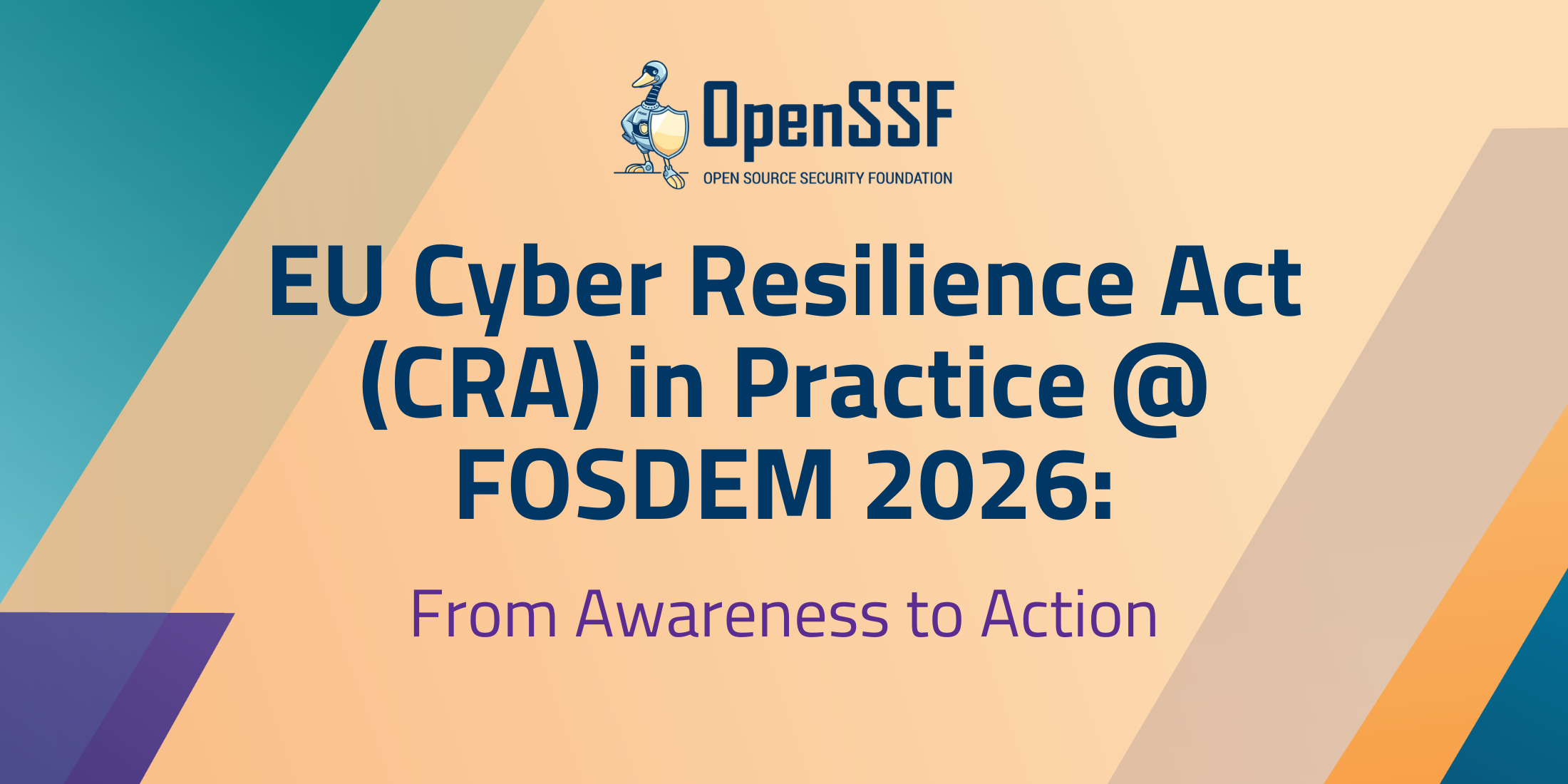


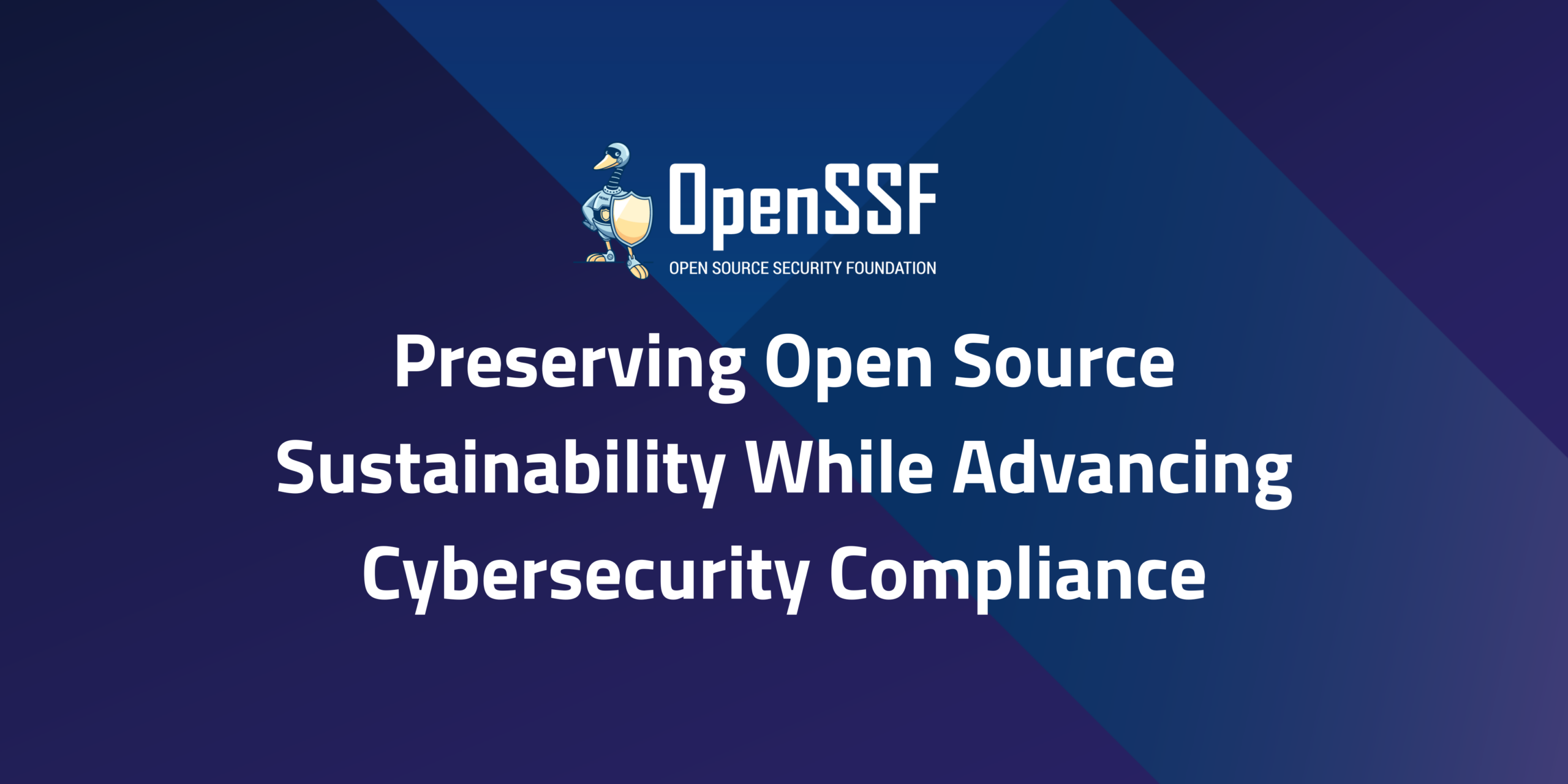
The European Commission has released an information website on CRA implementation:
The Commission has also published the first version of the FAQ:
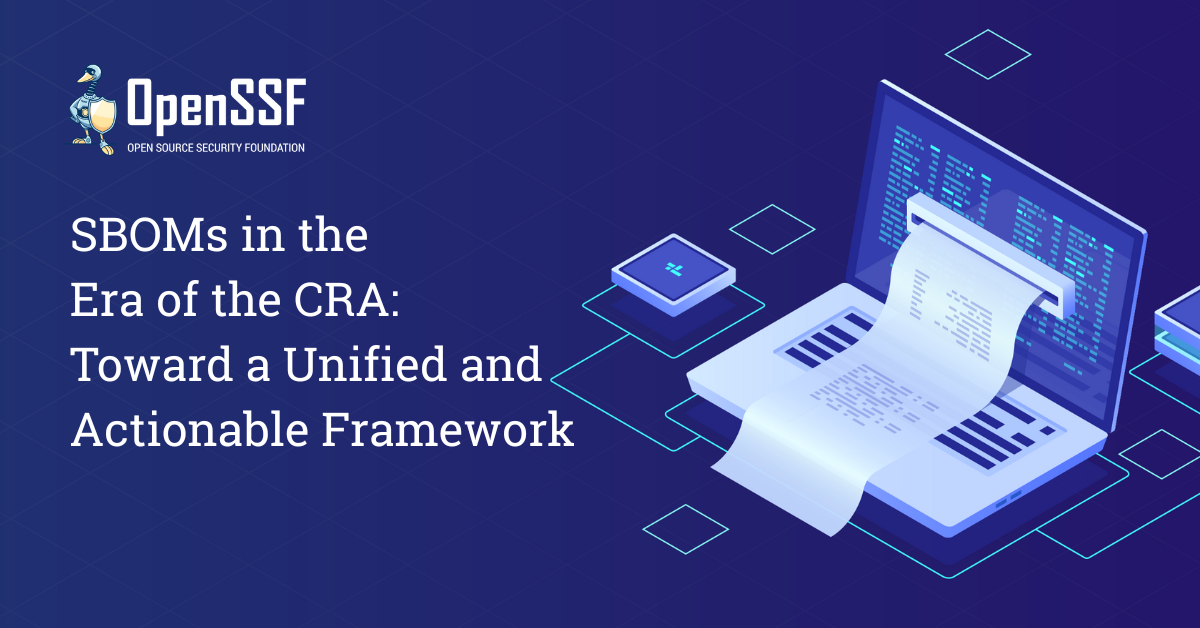
By Madalin Neag, Kate Stewart, and David A. Wheeler
In our previous blog post, we explored how the Software Bill of Materials (SBOM) should not be a static artifact created only to comply with some regulation, but should be a decision ready tool. In particular, SBOMs can support risk management. This understanding is increasing thanks to the many who are trying to build an interoperable and actionable SBOM ecosystem. Yet, fragmentation, across formats, standards, and compliance frameworks, remains the main obstacle preventing SBOMs from reaching their full potential as scalable cybersecurity tools. Building on the foundation established in our previous article, this post dives deeper into the concrete mechanisms shaping that evolution, from the regulatory frameworks driving SBOM adoption to the open source initiatives enabling their global interoperability. Organizations should now treat the SBOM not merely as a compliance artifact to be created and ignored, but as an operational tool to support security and augment asset management processes to ensure vulnerable components are identified and updated in a timely proactive way. This will require actions to unify various efforts worldwide into an actionable whole.
The global adoption of the Software Bill of Materials (SBOM) was decisively accelerated by the U.S. Executive Order 14028 in 2021, which mandated SBOMs for all federal agencies and their software vendors. This established the SBOM as a cybersecurity and procurement baseline, reinforced by the initial NTIA (2021) Minimum Elements (which required the supplier, component name, version, and relationships for identified components). Building on this foundation, U.S. CISA (2025) subsequently updated these minimum elements, significantly expanding the required metadata to include fields essential for provenance, authenticity, and deeper cybersecurity integration. In parallel, European regulatory momentum is similarly mandating SBOMs for market access, driven by the EU Cyber Resilience Act (CRA). Germany’s BSI TR-03183-2 guideline complements the CRA by providing detailed technical and formal requirements, explicitly aiming to ensure software transparency and supply chain security ahead of the CRA’s full enforcement.
To prevent fragmentation and ensure these policy mandates translate into operational efficiency, a wide network of international standards organizations is driving technical convergence at multiple layers. ISO/IEC JTC 1/SC 27 formally standardizes and oversees the adoption of updates to ISO/IEC 5962 (SPDX), evaluating and approving revisions developed by the SPDX community under The Linux Foundation. The standard serves as a key international baseline, renowned for its rich data fields for licensing and provenance and support for automation of risk analysis of elements in a supply chain. Concurrently, OWASP and ECMA International maintain ECMA-424 (OWASP CycloneDX), a recognized standard optimized specifically for security automation and vulnerability linkage. Within Europe, ETSI TR 104 034, the “SBOM Compendium,” provides comprehensive guidance on the ecosystem, while CEN/CENELEC is actively developing the specific European standard (under the PT3 work stream) that will define some of the precise SBOM requirements needed to support the CRA’s vulnerability handling process for manufacturers and stewards.
Together, these initiatives show a clear global consensus: SBOMs must be machine-readable, verifiable, and interoperable, supporting both regulatory compliance over support windows and real-time security intelligence. This global momentum set the stage for the CRA, which now transforms transparency principles into concrete regulatory obligations.
The EU Cyber Resilience Act (CRA) (Regulation (EU) 2024/2847) introduces a legally binding obligation for manufacturers to create, 1maintain, and retain a Software Bill of Materials (SBOM) for all products with digital elements marketed within the European Union. This elevates the SBOM from a voluntary best practice to a legally required element of technical documentation, essential for conformity assessment, security assurance, and incident response throughout a product’s lifecycle. In essence, the CRA transforms this form of software transparency from a recommendation into a condition for market access.
The European Commission is empowered, via delegated acts under Article 13(24), to further specify the format and required data elements of SBOMs, relying on international standards wherever possible. To operationalize this, CEN/CENELEC is developing a European standard under the ongoing PT3 work stream, focused on vulnerability handling for products with digital elements and covering the essential requirements of Annex I, Part II of the CRA. Its preparation phase includes dedicated sub-chapters on formalizing SBOM structures, which will serve as the foundation for subsequent stages of identifying vulnerabilities and assessing related threats (see “CRA workshop ‘Deep dive session: Vulnerability Handling” 1h36m35s).
In parallel, the U.S. Cybersecurity and Infrastructure Security Agency (CISA) continues to shape global SBOM practices through its “Minimum Elements” framework and automation initiatives. These efforts directly influence Europe’s focus on interoperability and structured vulnerability handling under the CRA. This transatlantic alignment helps ensure SBOM data models and processes evolve toward a consistent, globally recognized baseline. CISA recently held a public comment window ending October 2, 2025 on a draft version of a revised set of minimum elements, and is expected to publish an update to the original NTIA Minimum Elements in the coming months.
Complementing these efforts, Germany’s BSI TR-03183-2 provides a more detailed technical specification than the original NTIA baseline, introducing requirements for cryptographic checksums, license identifiers, update policies, and signing mechanisms. It already serves as a key reference for manufacturers preparing to meet CRA compliance and will likely be referenced in the forthcoming CEN/CENELEC standard together with ISO/IEC and CISA frameworks. Together, the CRA and its supporting standards position Europe as a global benchmark for verifiable, lifecycle aware SBOM implementation, bridging policy compliance with operational security.
The SBOM has transitioned from a best practice into a legal and operational requirement due to the European Union’s Cyber Resilience Act (CRA). While the CRA mandates the SBOM as part of technical documentation for market access, the detailed implementation is guided by documents like BSI TR-03183-2. To ensure global compliance and maximum tool interoperability, stakeholders must understand the converging minimum data requirements. To illustrate this concept, the following comparison aligns the minimum SBOM data fields across the NTIA, CISA, BSI, and ETSI frameworks, revealing a shared move toward completeness, verifiability, and interoperability.
| Data Field | NTIA (U.S., 2021 Baseline) | CISA’s Establishing a Common SBOM (2024) | BSI TR-03183-2 (Germany/CRA Guidance) (2024) | ETSI TR 104 034 (Compendium) (2025) |
| Component Name | Required | Required | Required | Required |
| Component Version | Required | Required | Required | Required |
| Supplier | Required | Required | Required | Required |
| Unique Identifier (e.g., PURL, CPE) | Required | Required | Required | Required |
| Cryptographic Hash | Recommended | Required | Required | Optional |
| License Information | Recommended | Required | Required | Optional |
| Dependency Relationship | Required | Required | Required | Required |
| SBOM Author | Required | Required | Required | Required |
| Timestamp (Date of Creation) | Required | Required | Required | Required |
| Tool Name / Generation Context | Not noted | Not noted | Required | Optional |
| Known Unknowns Declaration | Optional | Required | Optional | Optional |
| Common Format | Required | Not noted | Required | Required |
| Depth | Not noted | Not noted | Not noted | Optional |
The growing alignment across these frameworks shows that the SBOM is evolving into a globally shared data model, one capable of enabling automation, traceability, and trust across the international software supply chain.
The global SBOM ecosystem is underpinned by two major, robust, and mature open standards: SPDX and CycloneDX. Both provide a machine-processable format for SBOM data and support arbitrary ecosystems. These standards, while both supporting all the above frameworks, maintain distinct origins and strengths, making dual format support a strategic necessity for global commerce and comprehensive security.
The Software Package Data Exchange (SPDX), maintained by the Linux Foundation, is a comprehensive standard formally recognized by ISO/IEC 5962 in 2021. Originating with a focus on capturing open source licensing and intellectual property in a machine readable format, SPDX excels in providing rich, detailed metadata for compliance, provenance, legal due diligence, and supply chain risk analysis. Its strengths lie in capturing complex license expressions (using the SPDX License List and SPDX license expressions) and tracking component relationships in great depth, together with its extensions to support linkage to security advisories and vulnerability information, making it the preferred standard for rigorous regulatory audits and enterprise-grade software asset management. As the only ISO-approved standard, it carries significant weight in formal procurement processes and traditional compliance environments. It supports multiple formats (JSON, XML, YAML, Tag/Value, and XLS) with free tools to convert between the formats and promote interoperability.
The SPDX community has continuously evolved the specification since its inception in 2010, and most recently has extended it to a wider set of metadata to support modern supply chain elements, with the publication of SPDX 3.0 in 2024. This update to the specification contains additional fields & relationships to capture a much wider set of use cases found in modern supply chains including AI. These additional capabilities are captured as profiles, so that tooling only needs to understand the relevant sets, yet all are harmonized in a consistent framework, which is suitable for supporting product line management Fields are organized into a common “core”, and there are “software” and “licensing” profiles, which cover what was in the original specification ISO/IEC 5962. In addition there is now a “security” profile, which enables VEX and CSAF use cases to be contained directly in exported documents, as well as in databases There is also a “build” profile which supports high fidelity tracking of relevant build information for “Build” type SBOMs. SPDX 3.0 also introduced a “Data” and “AI” related profiles, which made accurate tracking of AI BOMs possible, with support for all the requirements of the EU AI Act (see table in linked report). As of writing, the SPDX 3.0 specification is in the final stages of being submitted to ISO/IEC for consideration.
CycloneDX, maintained by OWASP and standardized as ECMA-424, is a lightweight, security-oriented specification for describing software components and their interdependencies. It was originally developed within the OWASP community to improve visibility into software supply chains. The specification provides a structured, machine-readable inventory of elements within an application, capturing metadata such as component versions, hierarchical dependencies, and provenance details. Designed to enhance software supply chain risk management, CycloneDX supports automated generation and validation in CI/CD environments and enables early identification of vulnerabilities, outdated components, or licensing issues. Besides its inclusion with SPDX in the U.S. federal government’s 2021 cybersecurity Executive Order, its formal recognition as an ECMA International standard in 2023 underscore its growing role as a globally trusted format for software transparency. Like SPDX, CycloneDX has continued to evolve since formal standardization and the current release is 1.7, released October 2025.
The CycloneDX specification continues to expand under active community development, regularly publishing revisions to address new use cases and interoperability needs. Today, CycloneDX extends beyond traditional SBOMs to support multiple bill-of-materials types, including Hardware (HBOM), Machine Learning (ML-BOM), and Cryptographic (CBOM), and can also describe relationships with external SaaS and API services. It integrates naturally with vulnerability management workflows through formats such as VEX, linking component data to exploitability and remediation context. With multi-format encoding options (JSON, XML, and Protocol Buffers) and a strong emphasis on automation.
The OpenSSF has rapidly become a coordination hub uniting industry, government, and the open source community around cohesive SBOM development. Its mission is to bridge global regulatory requirements, from the EU’s Cyber Resilience Act (CRA) to CISA’s Minimum Elements and other global mandates, with practical, open source technical solutions. This coordination is primarily channeled through the “SBOM Everywhere” Special Interest Group (SIG), a neutral and open collaboration space that connects practitioners, regulators, and standards bodies. The SIG plays a critical role in maintaining consistent semantics and aligning development efforts across CISA, BSI, NIST, CEN/CENELEC, ETSI, and the communities implementing CRA-related guidance. Its work ensures that global policy drivers are directly translated into unified, implementable technical standards, helping prevent the fragmentation that so often accompanies fast-moving regulation.
A major focus of OpenSSF’s work is on delivering interoperability and automation tooling that turns SBOM policy into practical reality:
Completing this ecosystem is SBOMit, which manages the end-to-end SBOM lifecycle. It provides built-in support for creation, secure storage, cryptographic signing, and controlled publication, embedding trust, provenance, and lifecycle integrity directly into the software supply chain process. These projects are maintained through an open, consensus-driven model, continuously refined by the global SBOM community. Central to that collaboration are OpenSSF’s informal yet influential “SBOM Coffee Club” meetings, held every Monday, where developers, vendors, and regulators exchange updates, resolve implementation challenges, and shape the strategic direction of the next generation of interoperable SBOM specifications.
OpenSSF’s strategic support for both standards – SPDX and CycloneDX – is vital for the entire ecosystem. By contributing to and utilizing both formats, most visibly through projects like Protobom and BomCTL which enable seamless, lossless translation between the two, OpenSSF ensures that organizations are not forced to choose between SPDX and CycloneDX. This dual format strategy satisfies the global requirement for using both formats and maximizes interoperability, guaranteeing that SBOM data can be exchanged between all stakeholders, systems, and global regulatory jurisdictions effectively.
Through this combination of open governance and pragmatic engineering, OpenSSF is defining not only how SBOMs are created and exchanged, but how the world collaborates on software transparency.
The collective regulatory momentum, anchored by the EU Cyber Resilience Act (CRA) and the U.S. Executive Order 14028, supported by the CISA 2025 Minimum Elements revisions, has cemented the global imperative for Software Bill of Materials (SBOM). These frameworks illustrate deep global alignment: both the CRA and CISA emphasize that SBOMs must be structured, interoperable, and operationally useful for both compliance and cybersecurity. The CRA establishes legally binding transparency requirements for market access in Europe, while CISA’s work encourages SBOMs within U.S. federal procurement, risk management, and vulnerability intelligence workflows. Together, they define the emerging global consensus: SBOMs must be complete enough to satisfy regulatory obligations, yet structured and standardized enough to enable automation, continuous assurance, and actionable risk insight. The remaining challenge is eliminating format and semantic fragmentation to transform the SBOM into a universal, enforceable cybersecurity control.
Achieving this global scalability requires a unified technical foundation that bridges legal mandates and operational realities. This begins with Core Schema Consensus, adopting the NTIA 2021 baseline and extending it with critical metadata for integrity (hashes), licensing, provenance, and generation context, as already mandated by BSI TR-03183-2 and anticipated in forthcoming CRA standards. To accommodate jurisdictional or sector-specific data needs, the CISA “Core + Extensions” model provides a sustainable path: a stable global core for interoperability, supplemented by modular extensions for CRA, telecom, AI, or contractual metadata. Dual support for SPDX and CycloneDX remains essential, satisfying the CRA’s “commonly used formats” clause and ensuring compatibility across regulatory zones, toolchains, and ecosystems.
Ultimately, the evolution toward global, actionable SBOMs depends on automation, lifecycle integrity, and intelligence linkage. Organizations should embed automated SBOM generation and validation (using tools such as Protobom, BomCTL, and SBOMit) into CI/CD workflows, ensuring continuous updates and cryptographic signing for traceable trust. By connecting SBOM information with vulnerability data in internal databases, the SBOM data becomes decision-ready, capable of helping identify exploitable or end-of-life components and driving proactive remediation. This operational model, mirrored in the initiatives of Japan (METI), South Korea (KISA/NCSC), and India (MeitY), reflects a decisive global movement toward a single, interoperable SBOM ecosystem. Continuous engagement in open governance forums, ISO/IEC JTC 1, CEN/CENELEC, ETSI, and the OpenSSF SBOM Everywhere SIG, will be essential to translate these practices into a permanent international standard for software supply chain transparency.
The joint guidance “A Shared Vision of SBOM for Cybersecurity” insists on these global synergies under the endorsement of 21 international cybersecurity agencies. Describing the SBOM as a “software ingredients list,” the document positions SBOMs as essential for achieving visibility, building trust, and reducing systemic risk across global digital supply chains. That document’s central goal is to promote immediate and sustained international alignment on SBOM structure and usage, explicitly urging governments and industries to adopt compatible, unified systems rather than develop fragmented, country specific variants that could jeopardize scalability and interoperability.
The guidance organizes its vision around four key, actionable principles aimed at transforming SBOMs from static compliance documents into dynamic instruments of cybersecurity intelligence:
This Shared Vision complements regulatory frameworks like the EU Cyber Resilience Act (CRA) and reinforces the Open Source Security Foundation’s (OpenSSF) mission to achieve cross-ecosystem interoperability. Together, they anchor the future of SBOM governance in openness, modularity, and global collaboration, paving the way for a truly unified software transparency model.
The primary challenge to achieving scalable cyber resilience lies in the fragmentation of the SBOM landscape. Global policy drivers, such as the EU Cyber Resilience Act (CRA), the CISA-led Shared Vision of SBOM for Cybersecurity, and national guidelines like BSI TR-03183, have firmly established the mandate for transparency. However, divergence in formats, semantics, and compliance interpretations threatens to reduce SBOMs to static artifacts generated only because some regulation requires that they be created, rather than dynamic assets that can aid in security. Preventing this outcome requires a global commitment to a unified SBOM framework, a lingua franca capable of serving regulatory, operational, and security objectives simultaneously. This framework must balance policy diversity with technical capability universality, ensuring interoperability between European regulation, U.S. federal procurement mandates, and emerging initiatives in Asia and beyond. The collective engagement of ISO/IEC, ETSI, CEN/CENELEC, BSI, and the OpenSSF provides the necessary multistakeholder governance to sustain this alignment and accelerate convergence toward a common foundation.
Building such a framework depends on two complementary architectural pillars: Core Schema Consensus and Modular Extensions. The global core should harmonize essential SBOM elements, and CRA’s legal structure, into a single, mandatory baseline. Sectoral or regulatory needs (e.g., AI model metadata, critical infrastructure tagging, or crypto implementation details) should be layered through standardized modular extensions to prevent the ecosystem from forking into incompatible variants. To ensure practical interoperability, this architecture must rely on open tooling and universal machine-processable identifiers (such as PURL, CPE, SWID, and SWHID) that guarantee consistent and accurate linkage. Equally crucial are trust and provenance mechanisms: digitally signed SBOMs, verifiable generation context, and linkage with vulnerability data. These collectively transform the SBOM from a passive unused inventory into an actively maintained, actionable cybersecurity tool, enabling automation, real-time risk management, and genuine international trust in the digital supply chain, realizing the OpenSSF vision of “SBOMs everywhere.”
SBOMs have transitioned from a best practice to a requirement in many situations. The foundation established by the U.S. Executive Order 14028 has been legally codified by the EU’s Cyber Resilience Act (CRA), making SBOMs a non-negotiable legal requirement for accessing major markets. This legal framework is now guided by a collective mandate, notably by the Shared Vision issued by CISA, NSA, and 19 international cybersecurity agencies, which provides the critical roadmap for global alignment and action. Complementary work by BSI, ETSI, ISO/IEC, and OpenSSF now ensures these frameworks converge rather than compete.
To fully achieve global cyber resilience, SBOMs must not be merely considered as a compliance artifact to be created and ignored, but instead as an operational tool to support security and augment asset management processes. Organizations must:
By embracing this shared vision, spanning among many others the CRA, CISA, METI, KISA, NTIA, ETSI, and BSI frameworks, we can definitively move from merely fulfilling compliance obligations to achieving verifiable confidence. This collective commitment to transparency and interoperability is the essential step in building a truly global, actionable, and resilient software ecosystem.
 Madalin Neag works as an EU Policy Advisor at OpenSSF focusing on cybersecurity and open source software. He bridges OpenSSF (and its community), other technical communities, and policymakers, helping position OpenSSF as a trusted resource within the global and European policy landscape. His role is supported by a technical background in R&D, innovation, and standardization, with a focus on openness and interoperability.
Madalin Neag works as an EU Policy Advisor at OpenSSF focusing on cybersecurity and open source software. He bridges OpenSSF (and its community), other technical communities, and policymakers, helping position OpenSSF as a trusted resource within the global and European policy landscape. His role is supported by a technical background in R&D, innovation, and standardization, with a focus on openness and interoperability.
 Kate is VP of Dependable Embedded Systems at the Linux Foundation. She has been active in the SBOM formalization efforts since the NTIA initiative started, and was co-lead of the Formats & Tooling working group there. She was co-lead on the CISA Community Stakeholder working group to update the minimum set of Elements from the original NTIA set, which was published in 2024. She is currently co-lead of the SBOM Everywhere SIG.
Kate is VP of Dependable Embedded Systems at the Linux Foundation. She has been active in the SBOM formalization efforts since the NTIA initiative started, and was co-lead of the Formats & Tooling working group there. She was co-lead on the CISA Community Stakeholder working group to update the minimum set of Elements from the original NTIA set, which was published in 2024. She is currently co-lead of the SBOM Everywhere SIG.
 Dr. David A. Wheeler is an expert on open source software (OSS) and on developing secure software. He is the Director of Open Source Supply Chain Security at the Linux Foundation and teaches a graduate course in developing secure software at George Mason University (GMU). Dr. Wheeler has a PhD in Information Technology, is a Certified Information Systems Security Professional (CISSP), and a Senior Member of the Institute of Electrical and Electronics Engineers (IEEE). He lives in Northern Virginia.
Dr. David A. Wheeler is an expert on open source software (OSS) and on developing secure software. He is the Director of Open Source Supply Chain Security at the Linux Foundation and teaches a graduate course in developing secure software at George Mason University (GMU). Dr. Wheeler has a PhD in Information Technology, is a Certified Information Systems Security Professional (CISSP), and a Senior Member of the Institute of Electrical and Electronics Engineers (IEEE). He lives in Northern Virginia.
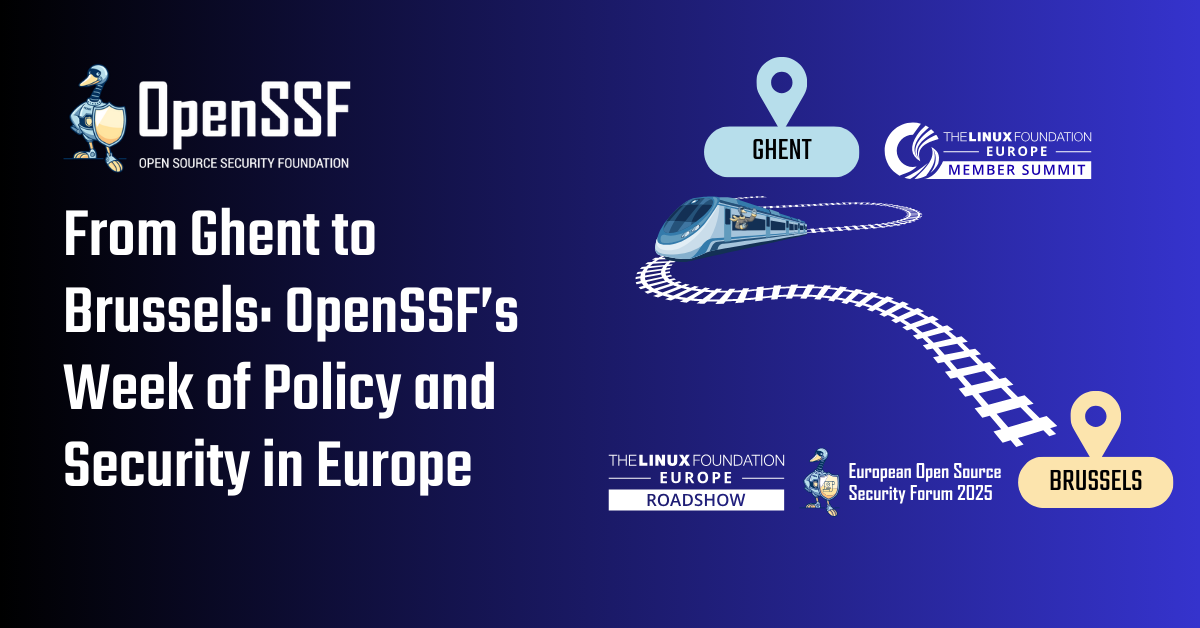

In this episode of ‘What’s in the SOSS” CRob dives deep into the Erlang ecosystem with Jonatan Männchen (CISO, Erlang Ecosystem Foundation), Ulf Riehm (Product Owner, Herrmann Ultraschall), and Michael Winser (Alpha-Omega). This episode explores the critical importance of security in open source, particularly in light of regulations like the CRA. Hear how the Erlang community is proactively addressing security concerns by bringing in experts, fostering collaboration, and building trust. Discover why manufacturers are investing in upstream projects and how other ecosystems can learn from their approach. This conversation highlights the value of community, transparency, and the essential role of ‘stewards’ in the open source world.
00:00 Welcome
00:57 Meet the Guests
02:56 Jonatan’s Journey into Erlang
06:16 The Alpha-Omega Connection
09:07 Ulf’s Perspective as a Product Manager
13:09 Funding Security in Open Source
18:58 Challenges in Implementing Security
24:54 Becoming a CNA and Normalizing Security
28:18 Jonatan’s role as CISO
32:01 Calls to Action & Advice
36:49 Wrap Up
CRob (00:14)
Welcome, welcome, welcome to What’s in the SOSS, the OpenSSF’s podcast where we meet interesting people that are in and around the upstream open source ecosystem. My name’s CRob. I’m the chief security architect for the foundation, and I also do security stuff upstream to help protect that open source software we all know and love. And today I have an amazing collection of gentlemen here, and we’re talking about a very important topic. It’s about the value of bringing experts in.
So I would like to pass the microphone around. I’ll start off with Jonatan. Let’s introduce ourselves and kind of talk about what brought you here today to talk about this interesting topic.
Jonatan Männchen (00:57)
Yeah. Hi, I’m Jonathan Männchen. I’m the Chief Information Security Officer at the Erlang Ecosystem Foundation. And the reason I’m here today is that we’ve started implementing a lot of functionality in the security and in the compliance sector, mostly focused on the CRA. And based on that, I’ve met CRob and Michael, these lovely gentlemen in the Alpha and Omega call and was invited to come here and talk about it all.
CRob (01:31)
Ulf
Ulf (01:33)
Yeah, I’m a product owner with Herman Ultrasonics. We are a German machine builder, like a small company, 500 people only, not one of the big tech companies. And we have decided, arbitrary for a weird Swedish tech stack, including Erlang, to do our automation, to do our machine controls. And as a product owner, I had to make decisions whether how we would tackle security in the longer run. And that brought me here.
CRob (02:09)
Excellent. And our friend, Mr. Windsor.
Michael Winser (02:12)
Hi everyone. So I’m here for the free cookies. I was promised cookies. I think, you know, working in Alpha Omega, one of the surprising and the continuous benefits is that we end up finding community. find people and people find us and then that creates these connections. And so when Jonathan showed up in one of the public meetings and started chatting, I’m like, who are you? What are you doing? And we started talking more and that sort of led to more conversations and we’re still talking about things. that has spread to other parts of the airline community as well. And so the learnings continue. And for me, that’s just, it’s amazing what happens when you put people in a room and start talking together. So now here’s another room, let’s talk.
CRob (02:56)
Excellent. let’s start off. Jonathan, you’re here representing Erlang. Could you maybe talk to us about how you got into open source and maybe talk a little bit about what Erlang is all about?
Jonatan Männchen (02:56)
Mm-hmm. I think I started out quite the normal route, let’s say, just doing some side stuff from my corporate job, essentially. And as these things normally go, you kind of feel responsible for them and they grow and you get more and more of these kind of side projects going on. Some of them getting successful, others you decide to cut the loss at some point. And…
Yeah, I really started in the PHP ecosystem a long time ago, doing some pull requests on Symfony. And I published a library that does a SIP streaming from the server to the browser and that kind of thing. And around 10 years ago, I actually read a book on Elixir specifically and Phoenix, which a roommate at the time bought and I don’t think he ever read it himself, but I did. And yeah, I had to try it out. We had like the perfect project of like a, it was essentially like a bit, an online game essentially with money involved where we would play the game via web sockets and we had to have the state on the server to make sure people don’t cheat.
CRob (04:30)
Mm-hmm.
Jonatan Männchen (04:31)
And that was kind of like the perfect use case because that’s basically the first thing you read always about Erlang can handle that many millions of sockets at the same time. And yeah, kind of figured out at that point that basically I don’t have to wait for the unicorn project where this is the perfect solution, but rather in the end, it’s a technology
that is complete, you can build things with it. I don’t have to stick with PHP for the normal stuff. And yeah, over the time I got more more involved into Elixir itself, also with other open source projects. And I think around three years ago, I’m not quite sure, could be two, could be four. I got involved in the Erlang Ecosystem Foundation and the Security Working Group as well.
Working together with a lot of people trying to make Erlang secure. And maybe as a side note here, Erlang, Elixir, Gleam, and also a few other languages are all languages based on Erlang. So kind of like what’s Scala to Java, for example. And towards the end of last year,
I was talking a lot to Alistair, which is one of the board members of the foundation. And he raised for a long time that the CRA is a topic that we need to be very careful about. And the stars lined up, my last job was ending and in the end, yeah, everything lined up perfectly. And since the start of the year, I’m at the CISO trying to implement all of that.
CRob (06:16)
Awesome. So let’s talk about this new stage that you’re in. You mentioned that you and Michael and I met together at an Alpha and Omega community meeting. Can you, you and Michael maybe talk a little bit about how you two got introduced and how you discovered this amazing community that AO is nurturing.
Jonatan Männchen (06:40)
Yes. I mean, wait, where do I start? So yes, we haven’t really talked at FOSDEM, but I got to know you just from speaking at FOSDEM. But yeah, let’s start there. So I was at…
Michael Winser (06:40)
I think it starts with you, Jonathan. I don’t know how you came to the meeting.
Was it it FOSDEM? I gave a talk at. OK, yeah.
Michael Winser (07:04)
Yeah, so I’ll go. At FOSDEM, I had a couple of talks, one of which was in a room that was partly organized by the folks from the STA and talking about funding and open source. And as you might imagine, it was a crowded room. A lot of people, a lot of questions, lot, and you know,
Mirko and I Mirko’s from the STA Tried to put together a presentation even to sort of explain what we are and how we do things or whatever And in 15 20 minutes, we obviously compressed a lot of thoughts and time into that But it worked as intended right that we got lots of good questions and people who didn’t even know What we did or why or whatever sort of started coming out of the woodwork and and it’s been really great and John is over to you:
Jonatan Männchen (07:52)
Yeah, it was actually the day before. It was the FOSDEM Fringe event. I was not present at your talk. I knew that it happened. But it was the SBOM Fringe event where you were also speaking. I also didn’t… I mean, I read through a lot of the OpenSSF stuff on a high level of what the OpenSSF is doing. And I saw Alpha and Omega, but I didn’t really go into details there. just knew that it existed. yeah, you talking actually brought it up in my mind. And we, as the foundation, we are in this spot where we now have some financing, which basically just extends to myself. But really to implement all of this, we need more help than we currently have. And so I thought it would be good to reach out. And that’s also why I joined the call.
CRob (08:22)
Mm-hmm.
Michael Winser (08:49)
I remember now, and that of course was completely unplanned. I was at that event as just a participant, and then Philippe asked me to come up and just say a few words, and I babbled some stuff, and here we are. So it’s always the sort serendipity things that really drive interesting outcomes.
CRob (08:49)
Excellent.
Ulf (09:05)
Okay.
CRob (09:07)
This is a really interesting topic and let me pull Ulf in for a moment. As a product manager, kind of selecting components that are going to go into a product that your organization sells. How important is it to know that these upstream projects you’re relying on have support and do take security seriously?
Ulf (09:33)
Well, I’m here as an antidote to a poison, is vendor lock-in. So the bigger part of my life, I’ve been part of industrial automation and we were running factories for automotive supplies or plastics or whatsoever. And as part of this company, we were building machines and we were using open source, but we were using it in a, I wouldn’t call it un-moral, but in a weird way that we were just using it, you know, and didn’t, we didn’t take care about what you say, whether it is maintained or safe, it’s just there and you download it and you make a dependency and that’s it. And the antidote is number one, that at one day we stumbled over Alistair as well on a, on a … That was actually… What was that? It was in Berlin. Yeah, Elixir event in Berlin. And we realized that there’s a huge foundation behind it. And that was the cornerstone. And later when the CRA requirements came down to us and we started to wrap our minds how we would fulfill these requirements and make safe software for our customers, then only we realized how important these foundations may become to us. And we were lucky in a way that previously for other reasons, for reasons of resilience and reasons of resource management and reasons of development speed and whatever, know, we have chosen for Erlang slash Alexia stack. And so we were kind of enthusiastic about it, but we never choose it in the first place for security reasons. Then later, we realized that we are in front of a huge challenge of complying with these requirements, which are from you, but basically the United States are doing very similar stuff under different naming and many of them requirements, they overlap. And then we realized, lucky we are that we have chosen a pond rather than an ocean. And that pond is so concise and kind of personal and kind of streamlined, I would say. That gave us the confidence that if we use it to address these challenges, we would possibly have a very concise community to which we can reach out and meet real people, talking real talks and tackling real problems.
CRob (12:22)
Hmm.
Ulf (12:26)
So that is kind of how we ended up here. And this is also what made us finally, which convinced also my owner, we have a company owner and my CEO and also my development officer that we would fund such a foundation to a degree which is maybe not much in comparison to what probably Intel or Meta is doing, but you have to put it into relation to what our annual turnover is. And in that measure, it is a considerable amount of money and we are willing to continue to do so.
CRob (13:09)
Nice.
Michael Winser (13:10)
I just want jump in. I think you would be surprised comparing yourself to what other corporations are doing. And I just, want to start by celebrating the several things here. One is sort of the pragmatic taking control of your destiny approach, right? And it’s always, you know, it’s open source. There’s a lot of stuff that happens and it’s like free as in beer. It’s like someone shows up and gives you beer. But as I like to say, it’s really more like free as in puppies and they need care and they need love. And Organizations that understand that and make that investment Find out all kinds of interesting things such as you now actually have a lot more like you can train your puppies to go in the right direction and not not You know pee in the kitchen, for example Metaphorically, we’re going to stop with that particular direction But I think it’s also an example of how in a competitive landscape regulation even sometimes ham-fisted regulation, I would certainly not attribute anything to one regulation or the other, but regulation is hard. But any kind of regulation essentially creates better incentives and it rises. Like everybody has to pay a little bit more attention to these things because, you know, in a competitive landscape, every dollar you spend on feeding your supply chain and taking care of your puppies is a dollar you’re not spending on marketing or development or whatever. But, you know,
It’s your code, even though you’re not the ones writing it, it’s in your business, it’s in your product. And so the care of that investing in that has a return. So first of all, kudos to you and your organization. I think it’s amazing. and it’s a pattern I would love to see sustained and repeated as more organizations can find ways to do so. And I think you’ve also shown it’s not that hard. You just show up and say, we’d like to make sure that this gets done properly and things happen.
Ulf (15:04)
Yeah, and I would like to add that it becomes even a rational choice. There’s not, I mean, when we talk about puppies, there’s a lot of love and care and all of that, right? But you can also see the case I have been describing as a very rational choice, because especially if you look into the alternatives.
One alternative would have been we would have developed security by our own. Yeah. Okay. And, and obviously that, that is a monstrous task and we would have needed competences, which clearly we do not have. And it would have taken a lot of time probably and would have been expensive. So that has been ruled out in the first place. And the second option would have been that we would have outsourced it to some contractor.
Ulf (13:19)
I mean, there are specialist companies out there. You can tell them what to do. They have the competencies and they will do it in a proper timing and for a proper cost. But still there is a downside to that, which is trust. Because if we go to our customers and tell them about security and we tell them, the security we are selling to you is actually the one we bought from this other guy. And, and he’s a specialist, I tell you.
Then our customer would say, who’s that? And what is he doing exactly? And how do you know? And all of that good questions from a customer point of view, that’s a proper question. And then no matter whether he was doing wrong or right, to build trust is very difficult. In turn, if we kind of outsource that, it’s not a real outsourcing because we don’t have a mandate here, right? We are just funding it.
Ulf (14:09)
But if this is done by somebody else which we do not influence directly, there’s two benefits. There’s never a smell of influencing in turn. So we can tell them what they’re doing is trustworthy because we are not influencing them. There’s no conflict of interests. And also if they are doing it and we are not mandating them directly, they would look for a bigger community, which was foster a more resilient solution landscape. I’m very convinced that this would happen. And both of them mechanisms, I can go back to my customer and tell them, look, and because of these two mechanisms, you can trust them guys a lot more than you can trust either us or a contract that we have bought. So if you look at down that road, it’s probably a very rational choice to kind of outsource things to people you’re not influencing. It sounds contradictious in the first place, but it’s not that much contradictions if you think it to the end.
CRob (15:10)
And the behavior you’re describing – how a manufacturer gets value out of these upstream projects and you have taken the very conscious decision that we’re going to try to support them. That is exactly the behavior that the CRA has explicitly written in is they’ve asked manufacturers like if you’re using upstream components, you should give back and participate. And I really applaud you all for making that choice very early on.
Ulf (18:33)
Yeah and also look into CRA. You have three choices. You’re a consumer, a manufacturer or a steward.
Michael Winser (18:40)
Yeah.
Ulf (18:41)
I don’t want to be a manufacturer in key matters. I would love to be a steward, but I can’t. It’s not in our competencies. So to say, I love to be a steward, I can’t, so I’m going to fund one.
CRob (18:58)
Let me turn the next question to Mr. Windsor. Why is it so hard for a lot of projects to implement good security practices and how does funding help that?
Michael Winser (19:12)
I love this question. So somewhat Ulf talked about starts with competency. know, not everybody is a, you know, well, let’s start with the problem of software supply chain security, right? As I love to say, it’s like the Y2K problem without the same clarity of problem solution or timeline. Right. Everyone is still learning a lot about this and we have decades of technical debt. So expecting, you know,
Mary and Joe, software developers working on a cool open source project to have competency in all the risks that they are essentially carrying forward is unreasonable. It’s just not practical. And any solutions we do are not going to be magically by teaching everybody to become security engineers at the same time, any more than everybody knows how to do front end, back end, or use airline as a language or rust or whatever. There are competencies that take real time and energy to acquire.
And that’s a big deal. The other aspect is it actually goes back to the same competitive pressures that corporations are feeling at the of deepest end of the supply chain or the furthest out to the right end of the supply chain. Open source projects are, you know, like have different reward mechanism. At the end of the day, being used, being valuable is something people care about.
And a lot of the signal that they receive from their downstream dependencies, right, is somewhat abstract, but it’s about usage. How many people are using me? How many, you know, GitHub stars, which please do not use GitHub stars as an indicator of popularity. but, know, and so they’ll do things that people are asking them to do. And invariably, what do people want to do? Like I’m building some software and somebody has built a module that does something for me.
CRob (20:46)
Stars and likes.
Michael Winser (21:00)
If I can shift the work onto them, so could you add a feature that does X, right? Says every enterprise customer ever, and says every open source project. Software developers want somebody else to do the things that they’re not good at, right? So I’m using some HTTP client library. It does some really cool. There’s now an edge case on dealing with streaming over HTTP 3, blah, blah, blah, blah. Could someone do that for me, rather than me having to add that to my application code, which is trying to plug tab A into slot B and make an NCP talk to Zapier, for example.
Michael Winser (21:30)
And so that’s a big part, right? There’s a lot of pressure and signal towards adding new features. There’s a competency they already have, which creates a fluency and ease of work around the feature set they’ve developed. So you have this hard hill to climb of security of things I don’t really know about, an easy and rewarding hill to climb, which is things I do know about and people are asking for, right? Those choices are too easy, right? It’s too easy to go down the path of doing more of that.
And unfortunately, that problem is bigger than that because the people who are downstream who would benefit from the security and might benefit from the feature sets, they don’t know more about the security. They don’t know more about the code. So who is going to do that work? How’s it going to happen? And, you know, this is where I think what’s awesome about what Ulf and company have done, right, is saying, look, we need to bring some experts here. And what I love about it too is the point of leverage, right?
So you could go and look at all the supply chain things and fix all the individual pieces, or you can make it someone’s job in an entire ecosystem to reason and think about that ecosystem and to make changes that are going to benefit all of them. And that’s the alpha of Alpha Omega is all about that scale.
Ulf (22:45)
And we would not have done it if we would not have faith in the fact that it can be done in that ecosystem. And we have faith it can be done in that specific ecosystem. Yeah. Because it’s so streamlined and so concise and so complete in it’s so feature complete that it helps us a lot. Yeah.
Michael Winser (23:06)
I think that’s really key. And I think that the other thing that comes out of this, I think we’re starting to see these in other ecosystems and I fully expect them to become like significant factors in the airline ecosystem as well, which is you’re normalizing security. So when you think about software engineers and the set of skills that they all think are common, right? There’s a certain subset of things.
CRob (23:23)
Mm-mm.
Ulf (23:23)
Yes.
Michael Winser (23:31)
what we’re starting to do is to normalize a broader set of things around security concerns. So not everybody’s going to become a security expert, but if everybody’s aware of security and like, I should do this. it, mean, some of these things aren’t even about implementing more secure code, right you could probably talk for days on how maybe you should handle reports around vulnerability and just having process around vulnerabilities in your projects. And when somebody does tell you, whoopsie, you actually even have a process to handle that.
CRob (23:54)
Exactly.
Michael Winser (24:01)
That is a significant gap for an awful lot of open source projects.
CRob (24:04)
Mm-hmm.
Jonatan Männchen (24:05)
Which is, the way, also a gap we’re very specifically addressing. We’re in the process of becoming a CNA [CVE Numbering Authority]. We’re currently in the onboarding workflow, not done yet. But we’re actually becoming a CNA for every package that is in the package manager, if they’re not covered somewhere else. Just because we think that we have more tools available to do the correct decisions in the whole thing and also reach the
Michael Winser (24:13)
Yes.
CRob (24:26)
Nice.
Jonatan Männchen (24:34)
Correct people than MITRE ever could just because they’re not part of that ecosystem specifically. yeah, so we really want to cover this as a CNA and also build in all the vulnerability reporting into the default tooling so everybody gets the benefits of that.
CRob (24:41)
Exactly.
That’s awesome.
Michael Winser (24:54)
This is, this is, mean, this is a pattern we’re seeing more and more, right? And, know, there’s now documentation well written by other parts of the Alpha Omega family on how to be a CNA. This is what we did, how it worked out or whatever. It’s worth stating to the perhaps, you know, less CNA obsessed listener, right? That one of the things that happens here is that the community can have a more curated control over what is being reported as a vulnerability and the process gets centralized. And this is not to impugn our
CRob (25:20)
Mm-hmm.
Michael Winser (25:24)
Esteemed colleagues in the security research industry, right? But they have incentives to find vulnerabilities and want to push them out and like that and when you push them either straight up to MITRE or directly to the individual project there is none of that curation happening and this allows an Esteemed set of experienced people in the airline community to make sensible decisions about is this really a vulnerability? What severity it has and so forth and there’s still a dialogue and should be a dialogue with the researcher, but it’s not
Sort of like the problem is that there’s no dialogue with MITRE or it just happens. There you go. And then it’s very hard to undo that later on. And it drags around creating, you know, imperfect signal for people consuming things.
CRob (26:03)
Right. So, I see you as representing kind of a really exciting new trend that we’ve witnessed over the last few years, where communities are reaching out and bringing in subject matter experts to become this developer, security developer in residence, kind of having this role. From your perspective, and your role as CISO for Erlang, what do you see your role is in helping your community?
Jonatan Männchen (26:34)
I think the biggest part is to figure out what should we actually be doing. Because there’s lots of regulation from lots of different countries. Nothing is harmonized. And then even, for example, the open SSF, there is so many things in there just sifting through what does actually apply to us. And there’s other organizations than the open SSF as well. So just figuring out what should we be doing, I think is the biggest part.
CRob (26:39)
Mm-hmm.
Right.
Jonatan Männchen (27:04)
And yeah, I’ve started putting together essentially a roadmap of things that we want to implement. Also, there’s some stuff that I can directly tackle myself just because they’re in a size that makes sense for me to invest that in my time. For example, we just did the open chain certification for Elixir or the CV numbering authority, which is talked about.
CRob (27:22)
Very nice.
Jonatan Männchen (27:34)
And we also just implemented the best practices batch for Elixir as well. So there’s lots of different things going on and there’s lots of them, yeah, where I can just look at them, do them, get it done. But there’s also bigger ones like for example, implementing SLSA throughout the whole package manager, where we’re more at the point where we need additional help just because it doesn’t make sense for me to focus on that for that long time right now. And so.
CRob (27:53)
Mm-hmm.
Jonatan Männchen (28:04)
I’m trying to figure out a way of organizing all of that and getting the funding and figuring out what is exactly we’re trying to do. And yet just put together a plan that actually could work essentially.
CRob (28:18)
Michael?
Michael Winser (28:20)
I’m glad you mentioned SLSA and You and I should chat offline for some specifics but I’ve been working within the SLSA working group for a while and one of the members out Tom Hennan has created there’s one of the tracks we’re working on this the build track there’s a less developed thing called the build environment track which manages the sort of Security of the environment which run the Maturing nicely is something called the source track around dealing with the provenance of the source code and the environment in which the source was created, right? And so being able to say you have branch protection on and things like that, and there’s a set of requirements. Well, Tom has produced a very simple little workflow. There’s still in sort of prototype phase that makes getting to SLSA level three of source level three provenance, where you have this continuous from a date, point in time forward chain of trust for all the commits to your repo incredibly easy to achieve.
And so would love to work with you and the Erlang and the Elixir space and the package manager space to do that and then Connected back to trusted publishing depending upon the workflow from there to publishing into the package manager You can start to see an end-to-end provenance story. That is very interesting and You know last week I had a chat with some of your colleagues from Erickson who work on the OTP stuff and I was asking them about what what’s their interest to the package manager versus the other parts of the ecosystem and
They build from source, use the force, build the source. And so that eliminates a lot of tampering threats in the build space, but they still care about the provenance and authenticity of the source. And by the way, they also say they very much care about the health of the ecosystem as well. And so they’re to help out in various ways. So there are dots to connect there that I hope are, and this is part of what we’re funding at Alpha Omega, that reduce the toil for someone like you and your ecosystem to kind of take those next steps.
CRob (30:16)
And I bet as a product manager, Ulf, this would be a really compelling story if you knew that the components that you were putting integrating into your products had this pedigree and provenance that had that chain of custody and they were untampered with.
Jonatan Männchen (30:16)
Mm-hmm.
Ulf (30:31)
Absolutely, and that even if I knew that would be the case then still there’s tons of work to do for security so I’m offloading a part of the problems we are facing and still Previously we mentioned that or I mentioned that probably we do not have the competencies in security and Probably under rating our company. Of course, we have experts in that matter but not to that extent what Jonatan can do for us number one or the community can do for us, number two, or foundation can do for us, or CNA can do for us. And the processes you’re mentioning about making the correct ratings and making the correct proceedings in how to handle these vulnerabilities, all of that we can definitely not do. And still there’s tons of work to do to provide safe software or secure software to our customers from operating systems and good habits and proceedings in the pipelines and management of quality. All of that’s still down to us. And even there, we benefit from Jonatan providing best practices. Simply as that. It’s undisputed, right? Somebody calls out a best practice, it goes into our development rules, and here we go. So it’s simple. You don’t need to spend or wrap your brain around how to do that the best way. It’s a matter of trust.
At the end of the day, for us, it’s a matter of trust.
CRob (32:00)
Awesome. So as we wind down, I would like to talk about, you know, what is all your individual calls to action? You know, what if there are other communities, whether it’s a project or another language ecosystem, and they hear about this amazing story that the three of you are weaving together, you know, what advice would you give these communities and how they can enter in and become these, good stewards and good participants in these types of situations.
Jonatan Männchen (32:36)
Yeah, thinking a second what to say.
Michael Winser (32:39)
Why don’t I start? Because I’ve got the easiest thing to offer right up front. Whether you are an expert in coding, an expert in the problem space, an expert in the language or the package that you’re using in your business, the first and simplest thing to do is to engage, to contact the organizations upstream of yours and say, hello, my name is Michael, and I am benefiting from your work. I would like to make hello and say, how’s it going? Introduce myself so that when you have a problem later on, whether it is an audit finding out that your CRA compliance is at risk because of some practice or whether it’s a silly little bug or whether it’s a vulnerability has surfaced and you’re not sure whose fault it is or what to do or how to do something or what the importance of it is. If you already have a working relationship, even if it’s just purely social, if it’s just literally love in the human sense of like love is a verb, hello, how are you today?
I care about your work, right? You’re already so much better off than you would be otherwise. And so the first thing to do is to engage and to listen, and then you will have a very clear path of opportunities forward, or at least the connection when you need them.
Jonatan Männchen (33:53)
What I could add, a lot of people in an ecosystem don’t really look outside of that ecosystem. So it’s really important that you’re not trying to do everything by yourself. There’s lots of smart people from lots of different places that already thought about these things, but they haven’t thought about it in your specific programming language probably. But yeah, looking around what others are doing and actually connecting beyond the borders of your own ecosystem is probably one of the most important things to do.
Ulf (34:39)
And from a user perspective, of the other end of the food chain, whatever, I wish that more people would be honest about their usage of open source and their contribution and, know, distinguish clearly what is their added value with what they have developed and they willing to sell to their customers and what they have just, you know, grabbed as a base for what they want to offer as a customer value. And if that would be a more honest and a more transparent way of doing business, then automatically more people would join an initiative like we have been doing and that base would become a lot more resilient and even a lot.
And it will be worth the living, you know, for the people who are doing it. mean, currently, most of or many of them projects are maintained by enthusiasts and not for living. And sounds sounds wrong, kind of wrong. Yeah, I would like I can’t see why we should not distinguish between our added value and somebody else’s added value and make that very transparent. Transparency.
CRob (35:37)
Excellent. Well, gentlemen, I really appreciate your actions, both in your businesses and upstream and in your communities. And I thought this was a really insightful conversation. And I know we’ll be having more like this as items like the Cyber Resilience Act in Europe or legislation around the globe continues. This is going to be a matter of great importance that downstream has generated an unimaginable amount of value from the work of upstream. And there needs to be a way to be more participatory and to give back and to show that love that Mr. Windsor noted back to those developers that have given you so much. So gentlemen, thank you. I appreciate your time. And with that, happy open sourcing. That’s a wrap for us.
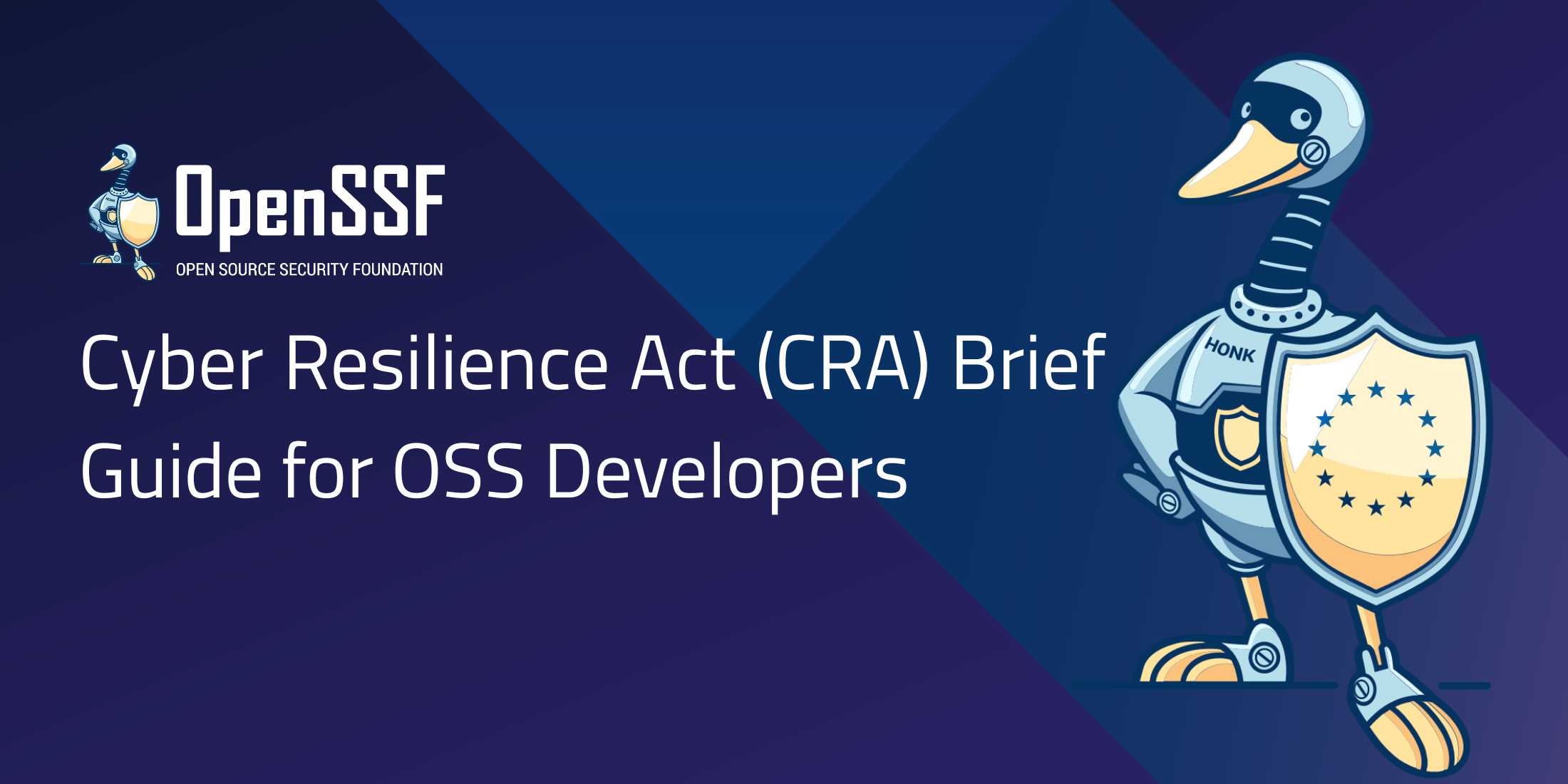
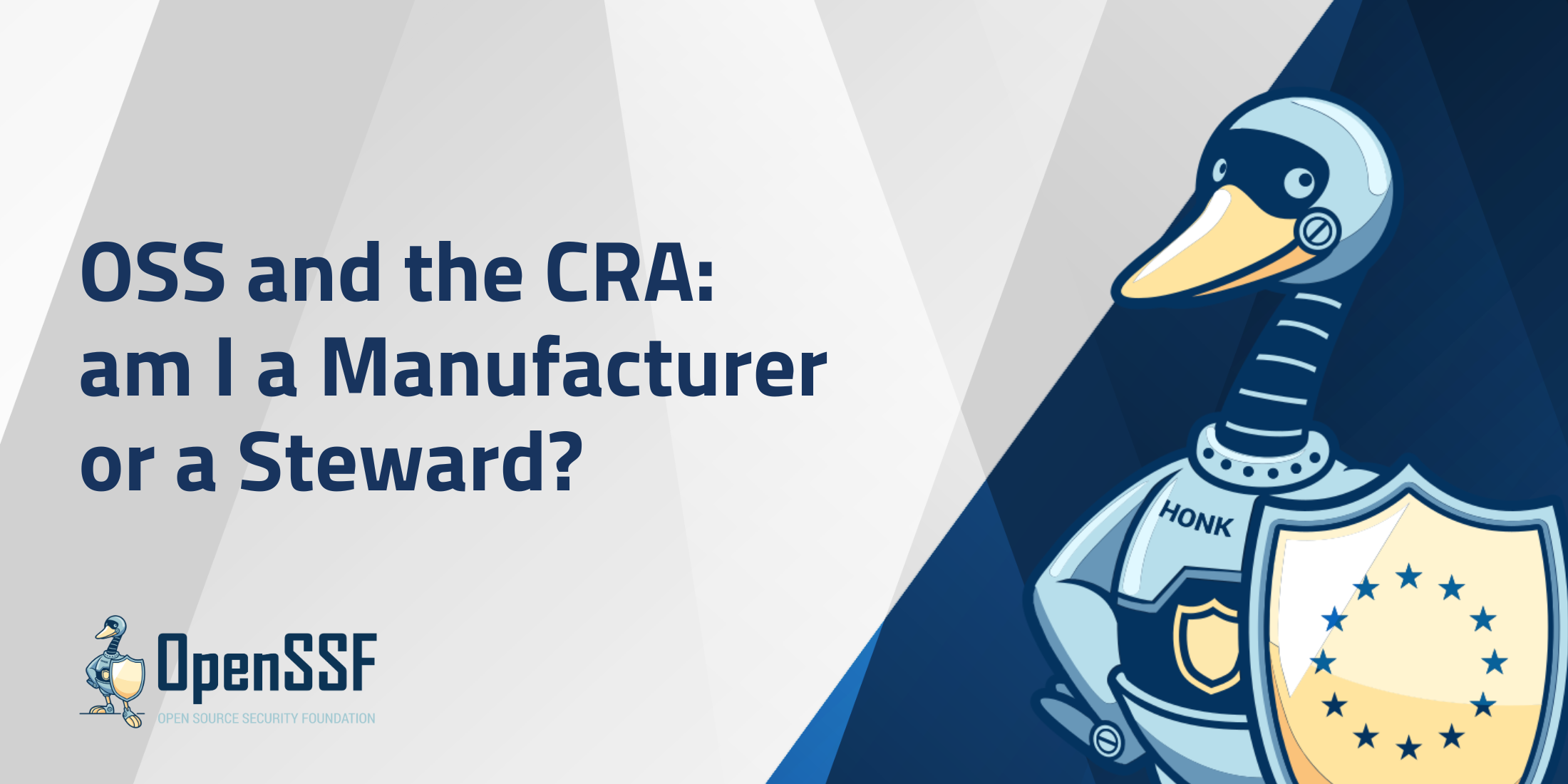
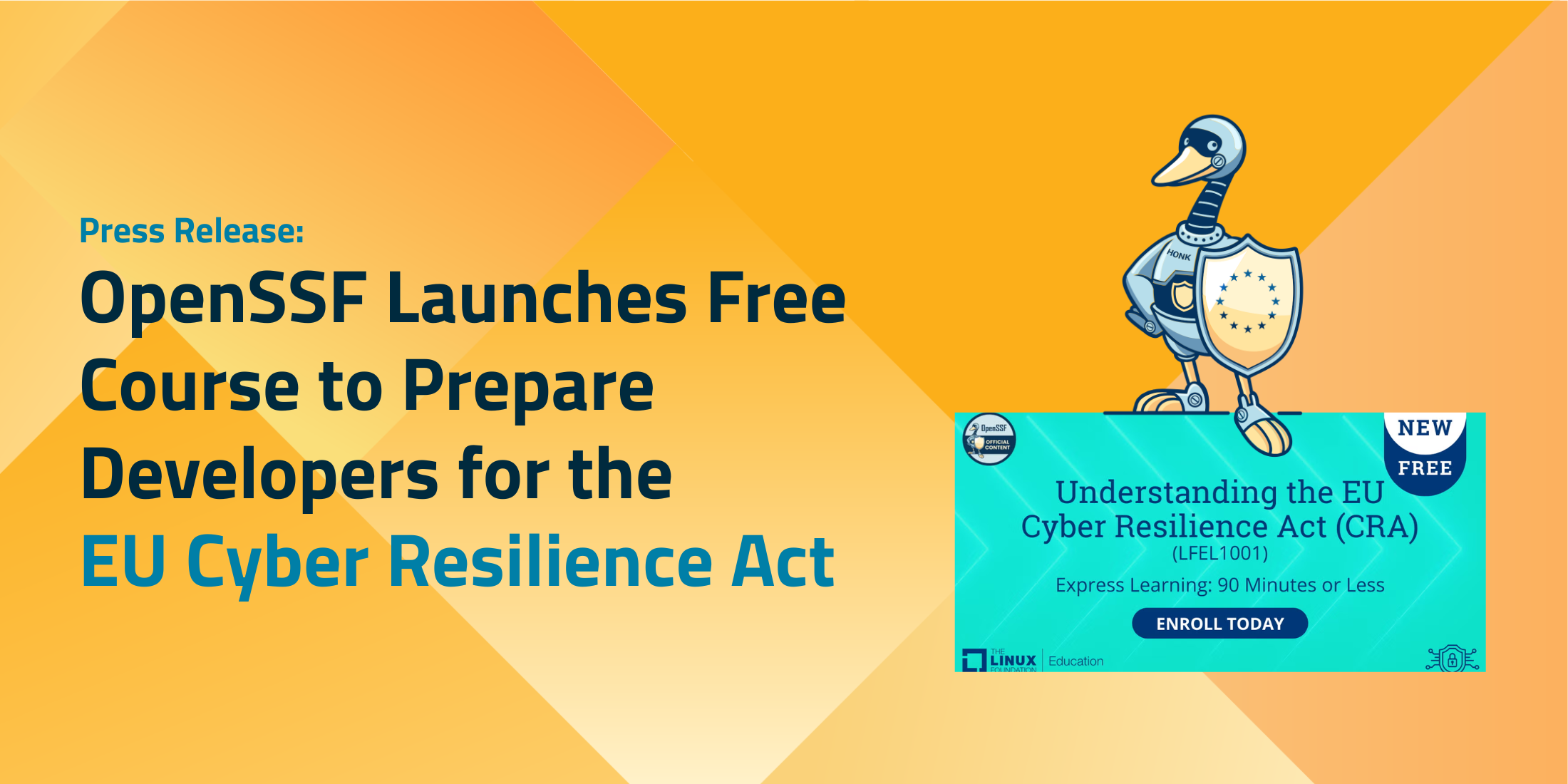
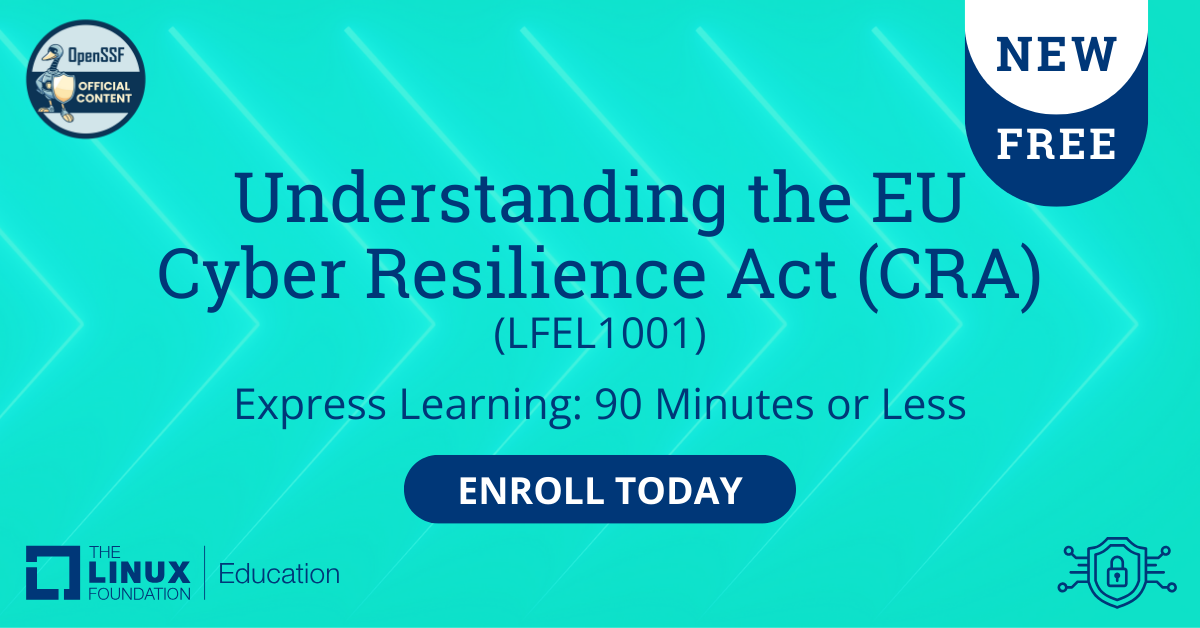
By Linux Foundation Education, see original blog.
OpenSSF and Linux Foundation Education have announced the launch of Understanding the EU Cyber Resilience Act (CRA) (LFEL1001), a new, free, Express Learning video course that covers:
The course is ideal for anyone needing to adapt to these new legal requirements, especially decision-makers and software developers – including those working with open source software – whose products may be commercially available in the EU.
“The Cyber Resilience Act (CRA) is critically important for all software developers and their managers to understand. It imposes requirements on many kinds of software, including open source, that have never been regulated before. The CRA applies even if the software wasn’t developed in the EU,” said David A. Wheeler, PhD, Director of Open Source Supply Chain Security, OpenSSF. “This completely changes the software development landscape. You could risk its substantial penalties, but it’s wiser to gain an understanding of it.”
The CRA is a landmark law that imposes new requirements on products with digital elements, including software, that are made commercially available within the European Union. It also imposes significant penalties for failure to comply in certain cases. Given the global nature of software and hardware development, many organizations and individuals not based in the EU will find themselves affected by the CRA.
Understanding the EU Cyber Resilience Act (CRA) (LFEL1001) will help those affected better prepare to understand and meet their obligations of the law and avoid the significant penalties the law can enforce. This includes the CRA’s requirements for developing secure software and managing vulnerability reports. The course will also note some of the uncertainties in the new law, explain how some are being addressed and provide recommendations on how to deal with such uncertainties.
Understanding the EU Cyber Resilience Act (CRA) (LFEL1001) is a free, 90-minute, self-paced, e-Learning video course. Those who successfully complete the course receive a digital badge and certificate of completion.